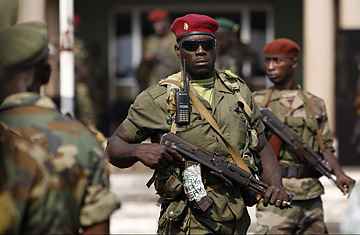
Soldiers loyal to the ruling military junta stand guard
During his 11 months in power, Guinean strongman Moussa Dadis Camara, an army captain turned head of state, has been famous for his rants on television. Locals call it the Dadis show, and Camara uses his screen time to personally expose corruption and ties between the former regime and the transatlantic cocaine trade.
But on Dec. 3, Camara was shot in the head twice by soldiers loyal to one of his lieutenants. Recuperating in a hospital in Morocco, Camara is unlikely to return to run the country anytime soon. Though his departure won't be mourned, it is probable that worse lies ahead for Guinea, a country of 10 million plagued by extreme poverty, corruption and dire governance.
Analysts like the New York–based Human Rights Watch worry that chaos in Guinea could threaten the wider region. Guinea borders Liberia and Sierra Leone, countries that are still recovering from civil wars that left hundreds of thousands killed or mutilated. To the east lies Ivory Coast, the former jewel of West Africa that remains divided following a civil war that broke out in 2002. Conflicts in this part of the world tend to cross borders, as the Guineans who fought in Liberia's war know all to well. A lively regional arms trade and recruitment of fighters could easily destroy years of peace building.
Camara hardly inspired much hope. In a documentary on news network France24, the 35-year-old soldier was keen to show off his bedside literature: a copy of the self-help book The Power of Positive Thinking. The hallway of his barracks is hung with a clumsy oil painting of him riding a horse, eyes fixed on the horizon like some latter-day Napoléon. Many in Guinea maintain that Camara lost control over the army within months of seizing power in a Christmas coup after the death of President Lansana Conte. He himself admitted as much after a massacre on Sept. 28, in which troops slaughtered some 160 opposition demonstrators in the national stadium. "Even the head of state cannot control this movement," he told French radio station RFI the day after.
And then came his own shooting. It appears to have been triggered by a botched attempt to arrest one of his closest collaborators in the junta, Lieutenant Aboubacar Diakite, alias Toumba, chief of the presidential guard. Toumba and Camara are part of an alliance of commanders that includes Captain Jean Claude Pivi, a former martial-arts champion who did not get along with Toumba.
The alliance is one of convenience more than one of ideology. In the main military camp in Conakry, where the junta holes up, each leader has his own barracks and his own loyal troops manning machine guns at the entrance. When I visited the camp in November, the atmosphere was tense and chaotic. Obvious signs of substance abuse — most likely cocaine — showed in the eyes of many soldiers. Men in uniform staggered around shouting and wildly waving their machine guns, and brawls appeared to be routine.
If the junta holds together at all, it will be thanks to its No. 2, General Sekouba Konate. The days after Camara was shot, Pivi's troops launched an assault on Toumba. Various reports of pillaging and violence by opposing factions emerged, but the chaos could have been worse. Konate was quick to outlaw Toumba, who is now in hiding, and scores of his supporters have been arrested.
The junta blames former colonial power France for the shooting, a time-honored way to distract attention and temporarily mend internal strife. Keeping up a smokescreen about Camara's condition also buys time. If Konate can command enough respect from the various factions to hold the military together, then he may emerge as the new leader. Crisis Group, a Brussels-based watchdog that closely follows the situation in Guinea, believes that's a real possibility. But Guinea's opposition is skeptical of his chances. "Right now, there is no government in Guinea," says a prominent politician by telephone from Conakry. "There is no discipline within the army at all." He calls for an international peacekeeping force to protect civilians from the military power struggle.
The big question is how the vacuum at the top in Guinea will impact security in the region. Neighboring countries seem to see the threat of the country's falling apart and engaged Camara and opposition parties to find a peaceful way out. With Camara gone, there might even be the possibility of a breakthrough under Konate. But nobody's betting on it.
